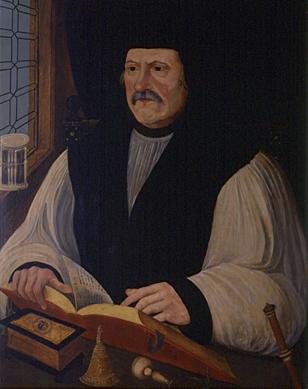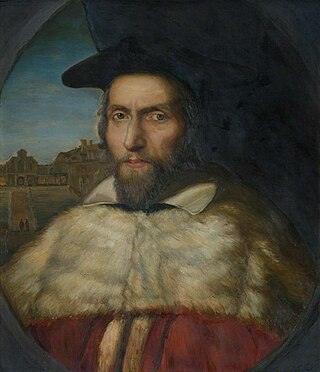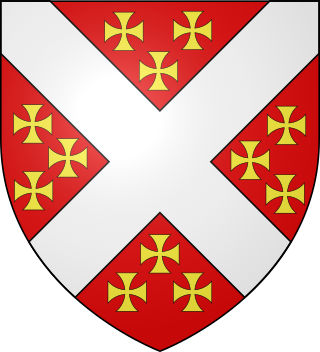
Matthew Parker was an English bishop. He was the Archbishop of Canterbury in the Church of England from 1559 to his death. He was also an influential theologian and arguably the co-founder of a distinctive tradition of Anglican theological thought.

Samuel Clarke was an English philosopher and Anglican cleric. He is considered the major British figure in philosophy between John Locke and George Berkeley. Clarke's altered,Nontrinitarian revision of the 1662 Book of Common Prayer continues to influence worship among modern Unitarians.

James Martineau was a British religious philosopher influential in the history of Unitarianism.

In Christianity,an anchorite or anchoret is someone who,for religious reasons,withdraws from secular society to be able to lead an intensely prayer-oriented,ascetic,or Eucharist-focused life. Anchorites are frequently considered to be a type of hermit,but unlike hermits,they were required to take a vow of stability of place,opting for permanent enclosure in cells often attached to churches. Also unlike hermits,anchorites were subject to a religious rite of consecration that closely resembled the funeral rite,following which they would be considered dead to the world and a type of living saint. Anchorites had a certain autonomy,as they did not answer to any ecclesiastical authority apart from bishops.

John Cosin was an English bishop.

St Clement Danes is an Anglican church in the City of Westminster,London. It is now situated near the 19th-century Royal Courts of Justice on the Strand. Although the first church on the site was reputedly founded in the 9th century by the Danes,the current building replaced the medieval church building and was completed in 1682 by celebrated architect Sir Christopher Wren. Wren's building was gutted by Luftwaffe bombing raids during the Blitz and not restored until 1958,when it was adapted to its current function as the central church of the Royal Air Force.

The Prayer Book Rebellion or Western Rising was a popular revolt in Cornwall and Devon in 1549. In that year,the first Book of Common Prayer,presenting the theology of the English Reformation,was introduced. The change was widely unpopular,particularly in areas where firm Catholic religious loyalty still existed,such as Lancashire. Along with poor economic conditions,the enforcement of English language church services only in Cornish-speaking areas led to an explosion of anger in Cornwall and Devon,initiating an uprising. At the gates of Exeter,the rising leaders announced,"and so we Cornishmen,whereof certain of us understand no English,utterly refuse this new English". In response,Edward Seymour,1st Duke of Somerset,sent John Russell to suppress the revolt,with the rebels being defeated and its leaders executed two months after the beginning of hostilities.

Rowland Taylor was an English Protestant martyr during the Marian Persecutions.
William Henry Sewell,English divine and author,helped to found two public schools along high church Anglican lines. A devout churchman,learned scholar and reforming schoolmaster,he was strongly influenced by the Tractarians.

Simon Patrick was an English theologian and bishop.

The Savoy Conference of 1661 was a significant liturgical discussion that took place,after the Restoration of Charles II,in an attempt to effect a reconciliation within the Church of England.

John Overall (1559–1619) was the 38th bishop of the see of Norwich from 1618 until his death one year later. He had previously served as Bishop of Coventry and Lichfield,as Dean of St Paul's Cathedral from 1601,as Master of Catharine Hall from 1598,and as Regius Professor of Divinity at Cambridge University from 1596. He also served on the Court of High Commission and as a Translator of the King James Version of the Bible.
Events from the 1550s in England. This decade marks the beginning of the Elizabethan era.

Robert Ronald Atwell is a British Anglican retired bishop,writer,and former Benedictine monk. From 2014 until 2023,he served as the Bishop of Exeter;from 2008 to 2014,he was Bishop of Stockport,a suffragan bishop in the Diocese of Chester.

Edward Denny,1st Earl of Norwich,known as The Lord Denny between 1604 and 1627,was an English courtier,Member of Parliament,and a peer.

Anthony Horneck was a German Protestant clergyman and scholar who made his career in England. He became an influential evangelical figure in London from the later 1670s,in partnership with Richard Smithies,curate of St Giles Cripplegate.
Bernard Williams was an Anglican priest. He was the son of the Rev. Henry Williams (1844–?). Bernard was born on 14 December 1869 at Croxton,Norfolk. He went to school at Bury St Edmunds and Norwich. He matriculated in 1889.
William Strong,was Archdeacon of Northampton from 1797 until his death.
A History of the Book of Common Prayer,with a Rationale of its Offices is an 1855 textbook by Francis Procter on the Book of Common Prayer,a series of liturgical books used by the Church of England and other Anglicans in worship. In 1901,Walter Frere published an updated version,entitled A New History of the Book of Common Prayer. Known commonly as Procter and Frere,the book remained a major text in the liturgiological study of the Book of Common Prayer through much of the 20th century. Later works,such as Geoffrey Cuming's 1969 A History of Anglican Liturgy,were written to supersede Procter and Frere as comprehensive studies following the release of further Anglican liturgical texts.

















